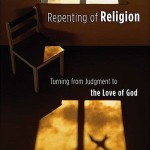We run our website the way we wished the whole internet worked: we provide high quality original content with no ads. We are funded solely by your direct support. Please consider supporting this project.

God’s Favor, Not Vengeance
Jesus began his ministry with a brief sermon in his hometown synagogue. Quoting Isaiah 61, Jesus said,
The Spirit of the Lord is on me,
because he has anointed me
to proclaim good news to the poor.
He has sent me to proclaim freedom for the prisoners
and recovery of sight for the blind,
to set the oppressed free,
to proclaim the year of the Lord’s favor (Lk 4:18-19).
He then shocked his fellow townspeople by announcing, “Today this scripture is fulfilled in your hearing” (vs. 21).
The “year of the Lord’s favor” refers to what was known as the “year of Jubilee” in the Old Testament. Every fifty years all debts were to be cancelled, all land lost through indebtedness was to be restored, and all slaves and prisoners were to be set free. It was, in short, a year in which all inequalities were to be abolished. This was obviously good news to lower class folks—the poor, the enslaved and imprisoned—but bad news to upper class folk who benefited from this social and economic inequality. It’s not too surprising that we have no historical record of this divine command ever being obeyed in ancient Israel.
In this first sermon, Jesus was presenting himself as the bringer of this “year of Jubilee.” He was announcing that his ministry and the movement he came to establish would erase all debts and reverse all judgments. This is why Jesus taught that people in the Kingdom must not expect to be repaid when we lend to others, even if they’re our enemies (Luke 6:35). It’s also why he taught that we’re to offer even more to thieves who steal from us (Matt 5:39-42). This is simply what it looks like to live out the year of Jubilee.
To live in this outlandish Jubilee way is to abolish all social distinctions and divisions. In the Kingdom, Jesus was saying, there is to be no distinction between the rich and the poor, the free person and the prisoner or slave, the able bodied and disabled beggars (as most disabled people had to be in the first century) or even between the holy and the unholy. Where God reigns, all distinctions and all social judgments are to be abolished.
The townspeople were both amazed at Jesus’ “gracious words” and understandably surprised that Jesus applied this teaching to himself. “Isn’t this Joseph’s son?” they wondered (vs. 22). But then they turned against him, to the point where they wanted him dead (vs. 29).
In part, their response to him was based in the social distinction between themselves and their enemies. Jesus stopped reading and put the scroll down right after he read “the year of the Lord’s favor.” Had he read the very next line, he would have added “and the day of vengeance of our God.” This omission wouldn’t have gone unnoticed by his first century Jewish audience. It undoubtedly contributed to their offense.
Most first century Jews were looking for a Messiah who would reveal “the Lord’s favor” toward them but also bring vengeance on their enemies—thus reinforcing common social distinctions. In fact, the vengeance they expected God to bring on their enemies was a central aspect of the favor they expected the Lord to show to them. Their good news was centered on the bad news they anticipated for their enemies. For them, therefore, the punch line of the passage was “the day of vengeance for our God.” Yet, Jesus stopped with “the Lord’s favor.”
Now, Jesus obviously believed in a future day of vengeance when God would judge the entire earth. But his refusal to apply this clause to himself reveals that he didn’t view himself or the movement he came to establish as the occasion for this divine vengeance to take place. In this epoch, Jesus is revealing, God’s favor is toward everyone—even the enemies of those who consider themselves righteous. In this epoch, God’s reign is marked by acceptance, not rejection.
Within the Kingdom, everything and everyone is to be considered forgiven. In the reign of God in this epoch, all indebtedness is to be cancelled; all social judgments such as those against imprisoned people are to be reversed; inequalities between “haves” and “have-nots” are to be abolished; and all distinctions between upper and lower classes, between the holy and the unholy and between insiders and outsiders done away with. Where God reigns, God’s favor, not vengeance, reigns—period.
Photo credit: aesedepece via Visual Hunt / CC BY
Category: General
Tags: Enemy Love, Forgiveness, Jesus, Justice, Love
Topics: Following Jesus
Related Reading

Making Resolutions? Consider This!
So, this is the time of year when we all look back at the year that is passing and look ahead to the new year in front of us. If you’re considering a New Year’s resolution, we wanted to make a tiny suggestion for your consideration. Greg has been fleshing out the ReKnew Manifesto in his…

Sermon Clip: Brain Reign
In this short clip, Greg Boyd discusses the 3 parts to who we are to help understand the brains role. What does role does the mind, body, and spirit play in who we are? In the full sermon we look at the New Testament teaching on reigning over the relational brain. Understanding how God wired…

God is Not a Monster
Pastor Brian Zhand has a way with words that captures the imagination. And he is a pastor that has taken time to read the church fathers. In a recent post, he quotes Saint Antony who wrote, “I no longer fear God, but I love him. For love casts out fear.” Brian confronts the common misconceptions and images of God that…

The Extremity of God’s Love
In response to questions he has received about whether Jesus was actually separated from the Father on the cross, Greg fleshes out his perspective on this. The love that unites the Trinity is the very same love that resulted in the separation of the Father from the Son. This separation actually expresses the great love…

Was Jesus Fully God and Fully Human?
In the previous post I argued for the logical possibility of the Incarnation, so today I’d like to establish its biblical foundation. This will be review for some readers, but it’s important review because this doctrine is the absolute bedrock of the Christian faith. For example, this doctrine alone is what allows us to claim…

Quotes to Chew on: God’s Love When We Rebel
“Despite the fall and its consequent curse, however, God’s love was not deterred. God is love. God doesn’t stop being God simply because the humans he created have rebelled against him. God does not abandon his goal of having others share in the eternal, ecstatic dance of the Father, Son and Holy Spirit. The world…
